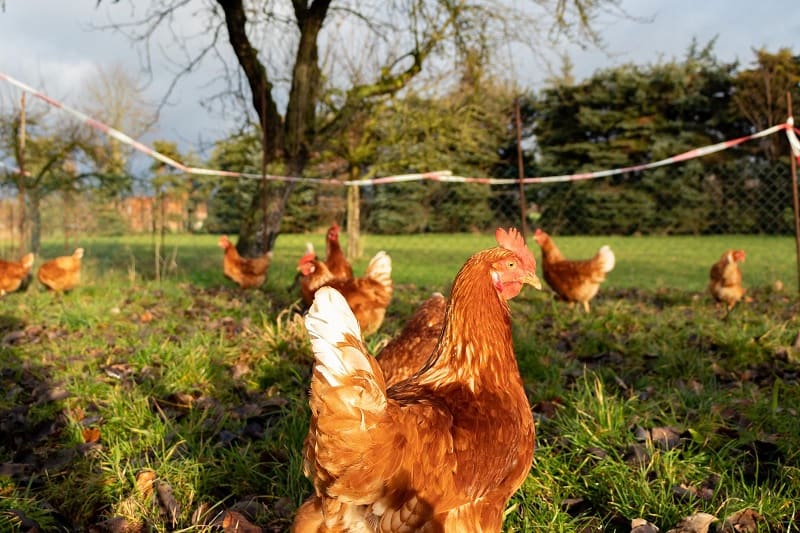Eggs are a staple ingredient used in cakes, frittatas, omelettes, or simply enjoyed in their own right.
Today, many people are conscious of the eggs they purchase. The better the eggs, the more balanced and nutritious they are, and the better they taste.
If you buy more ethical eggs, you can also enjoy your meal with a clean conscience knowing that the hens weren’t kept on battery farms.
However, egg labelling can be confusing! From free-range eggs to pasture-raised eggs, cage-free eggs and organic eggs, British supermarket aisles have their own labels and marketing tactics to get consumers to pick their products.
But what are the differences between organic vs. free-range eggs in the UK? Or are they the same thing?
Does Organic Mean Free Range in the UK?
You might be surprised to discover that organic eggs and free-range eggs are not one and the same!
Free-range eggs account for around 58% of all eggs in UK supermarkets, according to a 2022 government report. However, only about 3% of UK eggs are considered organic!
As the name suggests, free-range eggs are produced by hens that are free to roam in outside space during the day. At night, the chickens are kept inside barns to keep them safe from predators.
You might also see free-range eggs labelled as cage-free, pasture-raised, and barn-roaming eggs. You can read more about the criteria used to determine whether or not eggs in the Department for Environment, Food and Rural Affairs’s Guidance on Legislation Covering the Marketing of Eggs document.
Organic eggs are technically also a type of free-range egg, since all organic eggs are produced by free-roaming hens with unlimited access to pastures in the daytime. Yet to receive the “organic” label, the eggs must also meet other criteria regarding chemical usage, flock size, and conditions.

What’s The Difference Between Organic vs. Free Range Eggs?
The difference between organic vs. free-range eggs in the UK is all down to the animal welfare and the use of unnatural products used in production.
This can be broken down into five key criteria that all organic eggs must meet. Fall short on one of the below factors, and the eggs are labelled “free-range” instead.
1. No Genetically Modified (GM) Feed
Genetically modified food is made from organisms whose natural genetic material has been altered using biotechnology methods.
In the UK, GM foods are often used as animal feed. The crops usually have gene modifications that help improve their yield and keep costs low when feeding livestock.
Chickens cannot be fed GM food for eggs to pass UK organic standards. Instead, they must be fed natural food produced using organic methods that meet British regulatory standards.
They also forage, eating insects and grubs to keep them as healthy as possible.
In comparison, free-range hens may have been fed genetically modified food or food made with otherwise unnatural ingredients.
2. Smaller Flocks of Hens
The maximum size for a flock of hens is 3,000 chickens for their eggs to be classified as organic.
This flock size is much smaller than free-range eggs, which can be from flocks of up to 16,000 birds. This is according to the standards set by the RSPCA. When purchasing any eggs labelled as “RSPCA-Assured,” this ensures this flock limit and other welfare standards are met.
3. Nighttime Housing
As mentioned above, organic and free-range hens have unlimited access to outside pastures during the day. Both types of birds are housed inside at night to protect them from dangerous predators, foxes being of primary concern in the UK.
Free-range eggs are kept inside barns with a maximum of nine hens per square meter of usable space. However, organic hens are given more room to roam.
For eggs to be classed as organic, the birds’ nighttime housing must contain no more than six hens per square metre. This gives organic chickens that bit more space, as reflected in the quality of their eggs.
4. No Routine Antibiotic Treatment
The improper use of antibiotics can lead to problems such as antibiotic resistance, yet refusing to use antibiotics when birds are sick is detrimental to animal welfare. Therefore, routine antibiotics (administration before the birds are sick) are banned outright by UK organic standards. Instead, farmers can only administer antibiotics to protect hens’ health when ill.
Many free-range eggs are also grown without routine antibiotic treatment. However, this is not a requirement, and there is no guarantee that your free-range eggs will come from routine antibiotic-free hens.
Nevertheless, the British Poultry Association released a report that states a 76% decline in antibiotic use in poultry from 2012 to 2019.
5. Improved Animal Welfare
All the above points ensure that the hens laying organic eggs have the best animal welfare standards. These chickens have access to outdoor life, are fed natural food, aren’t given unnecessary medication, and are kept in smaller flocks where more care can be given to every bird.
You can rest assured that organic hens have the best lives possible! And this is shown in the quality of their eggs.
Free-range eggs also come from chickens with a pretty good living standard. This is especially true compared to caged hens who spend their lives cramped inside cages and in unsanitary conditions.
However, if you care about animal welfare, organic eggs ensure the highest standards of care possible in the UK.

Hannah is a freelance content writer passionate about natural health, mindfulness, and the environment. She shares her enthusiasm for a conscious lifestyle on Naturaler, inspiring others to take the steps towards a more natural and fulfilling life



